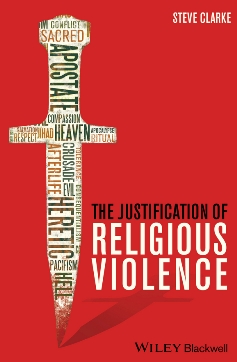 A newly published book by a Charles Sturt University (CSU) philosophy academic is the first to examine how religious violence is justified.
A newly published book by a Charles Sturt University (CSU) philosophy academic is the first to examine how religious violence is justified.
The book, The Justification of Religious Violence, is by Dr Steve Clarke, a senior research fellow at the CSU Centre for Applied Philosophy and Public Ethics (CAPPE) in Canberra, using research in psychology, cognitive science, neuroscience, and evolutionary biology.
Dr Clarke grapples with the long-standing and timely questions: how are justifications for religious violence developed and do they differ from secular justifications for violence? Can liberal societies tolerate potentially violent religious groups, and can those who accept religious justifications for violence be dissuaded from acting violently?
"The primary purpose of The Justification of Religious Violence is to look at arguments that people offer in the name of religion to justify violence," Dr Clarke said.
"There is a lot written elsewhere which looks at the issue of whether religion causes violence or not, but I have not tackled that issue. I confine myself to something which others do not do, which is to look at how arguments that appeal to religion for violent action are constructed.
"Religious arguments justifying violence are structurally similar to secular ones, but the religious are able to feed many more premises into those structures than the non-religious since they draw on the rich conceptual resources that the metaphysics of religious world views provide.
"The religious are able to appeal to God's wishes, God's commands, the benefits of going to Heaven, the benefits of avoiding Hell, the benefits of being reincarnated as a superior being, and the benefits of escaping from the cycle of reincarnation, as well as all of the justificatory sources that are appealed to by the secular."
The Justification of Religious Violence includes six in-depth contemporary case studies, and examines three widely-employed premises used in religious justifications of violence – 'cosmic war', the importance of the afterlife, and 'sacred values'. It considers to what extent liberal democratic societies should tolerate those who hold that their religion justifies violent acts, and reflects on the possibility of effective policy measures to persuade those who believe that violent action is justified by religion, to refrain from acting violently.
"In one chapter I look at ways to reduce violence, by undermining or overriding arguments for violence that appeal to religion," Dr Clarke said.
"So there is a social purpose which is to suggest ways in which religious violence can be reduced."The Justification of Religious Violence is part of the Blackwell Public Philosophy Series, and can be purchased from the publisher, Wiley, or here.





Social
Explore the world of social